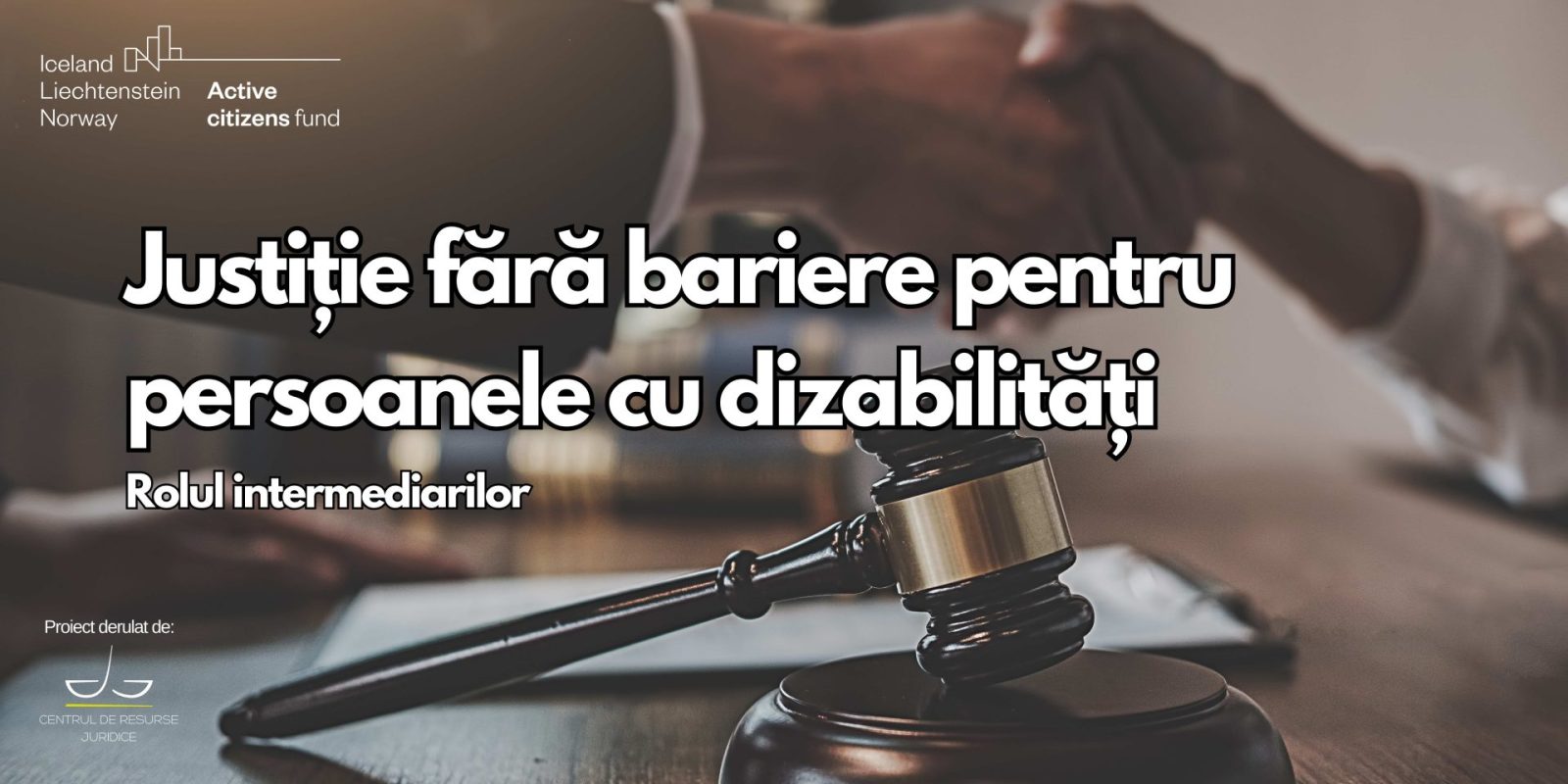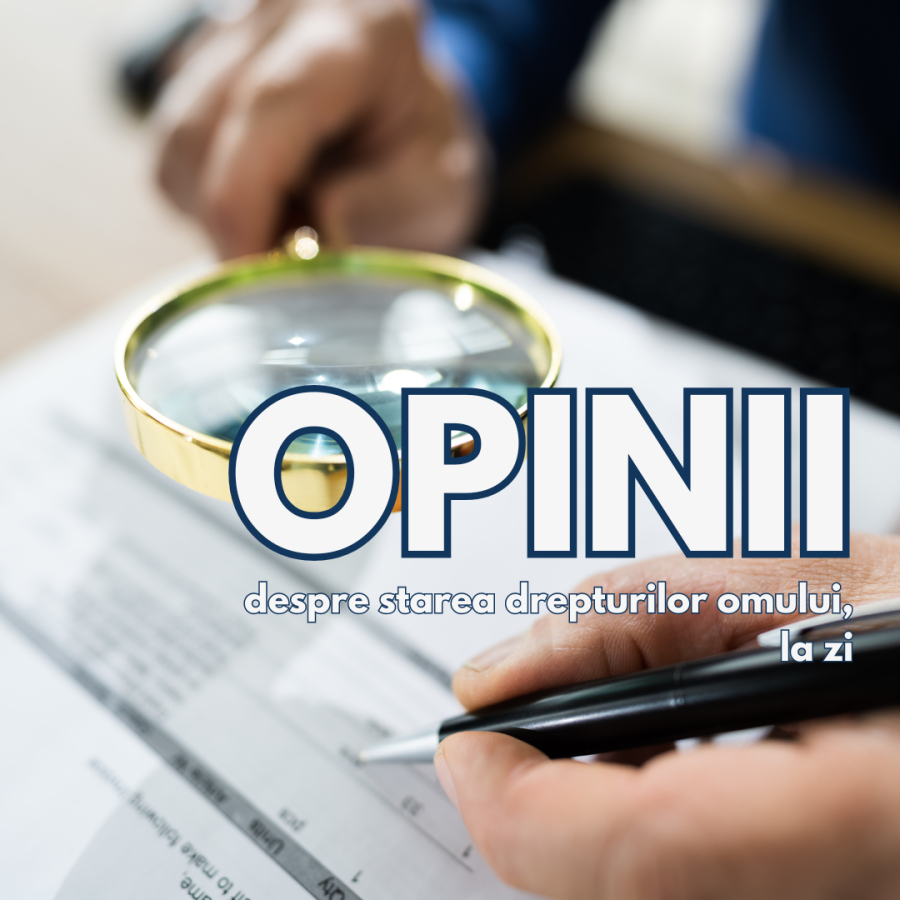1. Context
Free and effective access to justice represents a fundamental principle of the rule of law, enshrined both at the European[1] and national[2] levels. Beyond this status, the extent to which free access to justice is provided to citizens must be subjected to continuous critical analysis, as reality shows us the evidently perfectible nature of the procedural guarantees enjoyed by litigants.
Special attention needs to be paid to access to justice for persons with disabilities, with accessibility being the key principle of the United Nations Convention on the Rights of Persons with Disabilities. Thus, among the systemic deficiencies in ensuring effective access to justice for persons with disabilities, we note
- the lack of regulation for reasonable procedural adaptations[3], which would ensure that persons with disabilities can approach judicial bodies on an equal and non-discriminatory basis,
- the inadequacy of mechanisms for providing public legal aid in civil matters for persons with disabilities, and
- the absence of training and education procedures for court personnel and other judicial organs in understanding psychosocial disability, relating to, and managing cases involving persons with disabilities.
In this opinion, we aim to illustrate the need for regulating intermediaries/facilitators[4] for persons with disabilities within judicial and extrajudicial procedures so that their access to justice is real, not merely illusory.
2. Intermediaries in Justice
One of the most significant components regarding access to justice for persons with intellectual and/or psychosocial disabilities involves appropriate adjustments:
- intermediaries or facilitators,
- procedural adaptations and modifications,
- environmental adjustments,
- and support for communication.
There are numerous barriers within the justice system that hinder or even restrict equal access to justice for persons with disabilities: inadequate language, the rapid pace of proceedings, lack of comfort, overly strict rules, stigmatization, dehumanization, etc.
According to Article 13 of the Convention on the Rights of Persons with Disabilities (hereinafter referred to as CRPD), States Parties shall ensure effective access to justice for persons with disabilities on an equal basis with others, including by providing procedural and age-appropriate accommodations, to facilitate their active role as direct and indirect participants, including as witnesses, in all legal proceedings, including investigation and other preliminary stages.
Thus, the CRPD enshrines the need for making the act of justice accessible not only in the actual trial stage but also in the phase of reporting to competent bodies and prosecution (in criminal matters) and in the pre-litigation phase (in civil matters). Given their nature and purpose, judicial proceedings (both criminal and civil) are characterized by pronounced formalism, the use of arcane terminology, and procedural rules difficult to follow for those without legal training. Similarly, providing legal assistance[5] in the pre-litigation phase can prove challenging if the lawyer does not show understanding of the client’s specific case and circumstances.
From this perspective, persons with intellectual or psychosocial disabilities may perceive the conduct of judicial procedures as obscure, lacking transparency, and difficult to comprehend, which jeopardizes the guarantee of free and undiscriminated access to justice. Therefore, it is essential that entities involved in delivering justice have staff trained in interacting with persons with disabilities, so as to translate, in accessible terms, the implications of each judicial step, as well as the specific rights and obligations.
Regarding the pre-litigation phase, namely communication with a chosen or court-appointed lawyer, it is considered that individuals with intellectual or psychosocial disabilities should, if necessary, have access to a support person who can facilitate the accessible transmission of information from the client to the lawyer and vice versa. In Romania, the so-called specialization[6] of lawyers is not regulated, so there are no lawyers trained to handle specific cases, such as those involving individuals who are part of groups vulnerable to discrimination or whose rights are frequently or systematically violated. For this reason, it is believed that in the lawyer-client interaction, the intermediary’s purpose is to mediate any potential barriers in communication or understanding, ensuring that the person with disabilities understands the judicial steps available, the associated risks, and to make informed decisions accordingly. For instance, to ensure that the lawyer receives all relevant information regarding the client’s case, the facilitator can suggest asking questions in a calm, simplified manner, and support the client in fully explaining the factual situation, tailored to their needs and level of disability (using pictograms, images, objects).
In terms of interaction with judicial bodies, especially in the stage of hearing persons with disabilities, ensuring effective communication is crucial. Given that, in Romania, judges do not receive training in communicating with individuals with intellectual or psychosocial disabilities, and other procedural adaptations are non-existent, the courtroom/hearing environment can generate a state of fear and discomfort for disabled litigants. Thus, the intervention of a person who ensures that the individual with disabilities understands the context they are in, their rights, the inquiries from the judicial bodies, and in turn, is understood by the judicial bodies is necessary.
In the absence of the intermediation described above, there is an imminent risk that the factual situation known by the person with disabilities, regardless of their role as a victim, suspect, defendant, or party in a civil process, remains unknown or misunderstood by the judicial bodies. Additionally, the person with disabilities may be deprived of the effective exercise of their procedural rights (e.g., proposing evidence) because the judicial procedure is not explained to them in an accessible manner.
Intermediaries are neutral and do not speak on behalf of persons with disabilities or the judicial system, nor do they lead or influence decisions or outcomes. Impartiality and neutrality are essential in the role of an intermediary; failure to adhere to these principles can contaminate the evidence. The intermediary is not involved in the case itself but only in ensuring the participation of the person with disabilities is effective and non-discriminatory.
Considering the aspects mentioned above, the need to regulate the role of intermediary/facilitator within judicial procedures becomes evident. This role should be carried out with impartiality[7] towards the participants and the subject matter of the case in which they are appointed.
3. The Role of the Interpreter in Judicial Procedures, a Precursor to the Facilitator Role?
According to the provisions of Article 225, paragraph 2, of the Civil Procedure Code, if one of the parties has hearing and/or speech impairments or, for any other reason, cannot express themselves, communication with them will be made in writing. If they cannot read or write, an interpreter will be used.
Additionally, in criminal proceedings, whenever the person being heard does not understand, speak, or express themselves well in Romanian, the hearing is conducted through an interpreter. The interpreter can be designated by the judicial authorities or chosen by the parties or the injured person, among the authorized interpreters, according to the law[8].
However, the cited legal provisions prove to be insufficient and ineffective, as long as:
- Access to an interpreter is not regulated for the extrajudicial phase, such as communication with a lawyer, recourse to a mediator, and the like,
- The interpreter does not perform a prior assessment of the person with disabilities to identify and learn the appropriate communication methods for the party but interacts for the first time with the party at the moment of the hearing/communication with the judicial authorities,
- There are no regulations regarding the continuity of the same interpreter throughout the judicial procedure (i.e., if the person with disabilities attends multiple hearing sessions or court dates, the person of the interpreter differs). Thus, the opportunity to build a trust relationship between the interpreter and the party is not created.
Therefore, we believe that regulating access to an interpreter only ostensibly guarantees access to justice for persons with disabilities; in reality, the interpreter’s role is superficially provided in legislation, without clear procedures to create effective support for the party with disabilities.
4. Conclusions
Nonexistent in the current legislative framework, judicial intermediaries could represent a significant progress towards ensuring effective access to justice for persons with disabilities. In this regard, the conclusions of this opinion consider:
- Regulating in Romania’s classification of occupations the category of intermediary/facilitator for persons with intellectual or psychosocial disabilities,Including and funding the position of intermediary/facilitator in the organizational chart of courts, prosecutor’s offices, police stations, probation services,Supporting the creation of partnerships between the Bars of the National Union of Romanian Bars and intermediaries/facilitators, so that lawyers can access an intermediary upon request, to optimize interaction with their clients,Ensuring a national network of intermediaries/facilitators for persons with intellectual and psychosocial disabilities, capable of promptly intervening to support the interaction between persons with disabilities and other bodies involved in the administration of justice that have not included intermediaries/facilitators in their staff scheme.
________________________________________
[1] Article 47 of the Charter of Fundamental Rights of the European Union: Everyone whose rights and freedoms guaranteed by the law of the Union are violated has the right to an effective remedy before a tribunal, in accordance with the conditions laid down in this Article. Everyone is entitled to a fair and public hearing within a reasonable time by an independent and impartial tribunal previously established by law. Everyone shall have the possibility of being advised, defended, and represented. Legal aid is to be made available to those who lack sufficient resources insofar as such aid is necessary to ensure effective access to justice. [2] Article 21 of the Romanian Constitution:- Any person can address the justice system to defend their rights, liberties, and legitimate interests.
- No law can restrict this right.
- Parties have the right to a fair trial and to the resolution of cases within a reasonable time.
- Special administrative jurisdictions are optional and free of charge.



